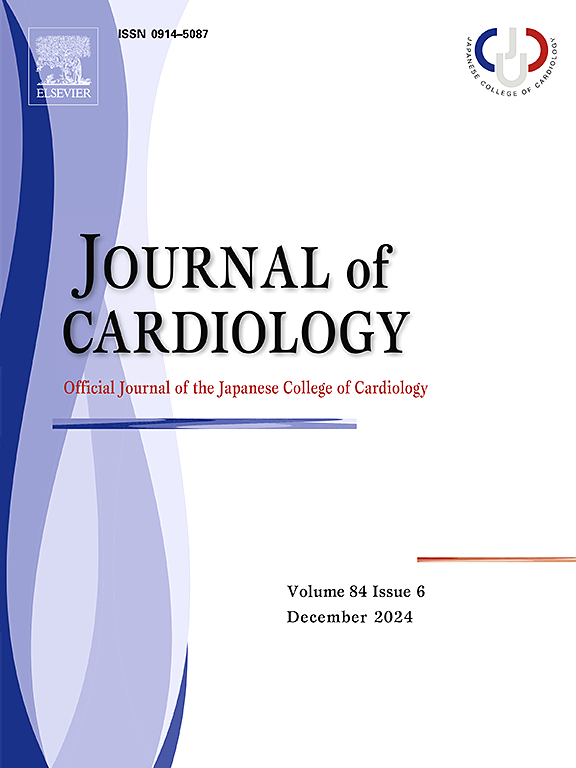In-hospital mortality and risk factors in critically ill patients with hypertrophic cardiomyopathy
IF 2.5
3区 医学
Q2 CARDIAC & CARDIOVASCULAR SYSTEMS
引用次数: 0
Abstract
Background
Hypertrophic cardiomyopathy (HCM) is a common genetic disease with estimated prevalence of 0.2–0.5 %. Contemporary management has substantially improved HCM outcomes. However, the impact of HCM on critically ill patients admitted to intensive care units (ICU) has not been well studied.
Methods
Unmatched and propensity score matched patients with or without HCM were examined in the MIMIC-IV database and compared for mortality, morbidity, and length of stay. Multivariable logistic regression was used to identify risk factors associated with in-hospital mortality in patients with HCM.
Results
Of 51,926 critically ill patients, 165 (0.32 %) were also diagnosed with HCM. Compared with those without HCM, patients with HCM had higher body mass index, higher rates of heart failure, atrial fibrillation, and chronic renal disease, and more often had implantable cardioverter defibrillators. There were no significant differences in in-hospital mortality (10.3 % vs 10.2 %) or length of stay (9.3 ± 9.6 vs 9.3 ± 1 0.6 days) between the two groups. Similar results were obtained in propensity score matched patients with or without HCM. Univariable analyses identified respiratory failure, sepsis, use of vasopressors, and circulatory support devices as predictors of in-hospital mortality in adults with HCM. In multivariable logistic regression analysis, respiratory failure and use of vasopressors and circulatory support devices were the predictors of in-hospital mortality in HCM patients.
Conclusions
Presence of HCM did not affect in-hospital mortality in critically ill patients, but the need for vasopressors and circulatory support devices predicted worse in-hospital mortality among critically ill patients with HCM.
肥厚性心肌病危重患者的住院死亡率及危险因素
背景:肥厚性心肌病(HCM)是一种常见的遗传性疾病,估计患病率为0.2-0.5 %。现代管理大大改善了HCM的结果。然而,HCM对入住重症监护病房(ICU)的危重患者的影响尚未得到很好的研究。方法:在MIMIC-IV数据库中检查未匹配和倾向评分匹配的HCM或不HCM患者,并比较死亡率、发病率和住院时间。采用多变量logistic回归确定与HCM患者住院死亡率相关的危险因素。结果:51926例危重患者中,165例(0.32 %)同时诊断为HCM。与没有HCM的患者相比,HCM患者有更高的体重指数、更高的心力衰竭、心房颤动和慢性肾脏疾病的发生率,并且更经常使用植入式心律转复除颤器。两组住院死亡率(10.3 % vs 10.2 %)和住院时间(9.3 ± 9.6 vs 9.3 ± 1 0.6 天)无显著差异。在倾向评分匹配的HCM或非HCM患者中也获得了类似的结果。单变量分析确定呼吸衰竭、败血症、血管加压药的使用和循环支持装置是HCM成人住院死亡率的预测因素。在多变量logistic回归分析中,呼吸衰竭、血管加压剂和循环支持装置的使用是HCM患者住院死亡率的预测因素。结论:HCM的存在不影响危重患者的住院死亡率,但对血管加压剂和循环支持装置的需求预示着HCM危重患者的住院死亡率更高。
本文章由计算机程序翻译,如有差异,请以英文原文为准。
求助全文
约1分钟内获得全文
求助全文
来源期刊

Journal of cardiology
CARDIAC & CARDIOVASCULAR SYSTEMS-
CiteScore
4.90
自引率
8.00%
发文量
202
审稿时长
29 days
期刊介绍:
The official journal of the Japanese College of Cardiology is an international, English language, peer-reviewed journal publishing the latest findings in cardiovascular medicine. Journal of Cardiology (JC) aims to publish the highest-quality material covering original basic and clinical research on all aspects of cardiovascular disease. Topics covered include ischemic heart disease, cardiomyopathy, valvular heart disease, vascular disease, hypertension, arrhythmia, congenital heart disease, pharmacological and non-pharmacological treatment, new diagnostic techniques, and cardiovascular imaging. JC also publishes a selection of review articles, clinical trials, short communications, and important messages and letters to the editor.
 求助内容:
求助内容: 应助结果提醒方式:
应助结果提醒方式:


